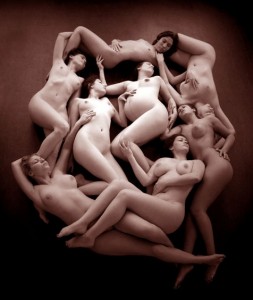Joyful Pain: The Psychosexual Effects of Giving Birth
Pregnancy is a period of mixed emotions for women. On one hand, it is the most wonderful experience in terms of the significance of a person being literally created from your care. However, many of the joyful elements of pregnancy may be overshadowed by its psychological and psychosexual toll. Fluctuating hormonal levels that accompany pregnancy and the post partum period wreak havoc on women’s mental health with its common symptoms of anxiety, depression, sadness, and irritability. Because pregnancy affects virtually all hormones in the body, what is undeniable is the profound psychological and psychosexual effects that giving birth, both prenatal and postnatal, has on female personality.
To understand the role hormones play on the psychological and sexual makeup of prenatal and postnatal women, scientists first analyze ovarian hormones – in particular, estrogens, androgens, and progesterone – and how an alteration in their bodily production influences psychosexual behavior. During early pregnancy, levels of estrogen and progesterone rise because the placenta – the organ that connects the developing fetus to the uterine wall – produces a hormone known as chorionic gonadotropin that stimulates the ovaries to continue to produce these essential hormones. Among the physiological effects of this occurrence include the cessation of the menstrual cycle as well as changes in how the body handles glucose levels. Following the second trimester of pregnancy, hormonal fluctuations cause a sharp rise in glucose levels in the blood because most of it is being conserved for use by the fetus. As a result, the pancreas is forced to produce more insulin. This fluctuation of blood sugar levels can lead to fatigue, irritability, or even a form of diabetes known as gestational diabetes.

With all these hormonal changes, researches from across the world documenting many cultures have published studies documenting an overall reduction in womenís sexual activities during pregnancy. In a study conducted by the Department of Obstetrics and Gynecology at the Chinese University of Hong Kong, surveys recorded that ìover 60% of the women had a reduction in sexual desire and enjoyment during pregnancy, and over 80% of the women worried about the adverse effects of sexual activity on the fetus.î While inadequate knowledge and hormonal activities influence the decision to refrain from sexual activity during pregnancy, the collapse of libido is also a sign of psychosexual disorder.
At the most basic level, psychosexual disorders are disturbances in sexual function due to psychological problems. This psychological anxiety and conflict over sex during pregnancy is influenced by both hormones, such as symptoms like fatigue or depression, or psychological disorders, such as the excessive anxiety towards hurting the child in some form if they engage in sex. Combine all these elements from pregnancy and the woman is left mentally exhausted. If the mental has no sexual drive, then this collapsed libido manifests itself in physical form in prenatal women. Such psychosexual dysfunctions include lack of vaginal lubrication or difficulty in achieving sexual arousal.
The popular belief is that following the birth of a healthy child with no complications to the mother, the most physically and mentally draining aspect of pregnancy is over. This belief is flawed. The sudden drop in estrogen, progesterone, endorphins, and other hormones postnatal may exacerbate depression, while the exhaustion that comes with carrying and delivering a child is never recovered from because women do not afford themselves the opportunity to rest for any significant period of time. Additionally, the psychological impact of compromising previously held independence and freedom to motherhood and all that entails cannot be understand. Making matters more difficult for mothers is internalizing the myth of the ìHappy Motherî while symptoms of postpartum mood disorders linger, such as fatigue, feelings of sadness, inability to cope, or general anxieties.

Even though it is the rarest form of postpartum mood disorder, postpartum psychosis affects between one and two women per 1,000 women who have given birth. It is characterized by the onset of psychotic symptoms and behaviors, such as extreme fluctuations of mood swings or random and uncontrollable anxiety attacks. Studies place the number of postpartum women who suffer from a severe form of mental illness known as Postpartum Depression ranges between 10-20%. Such chronic disorders influence not only the sexual drive of women permanently, but their relationship with their newborn. Because most forms of Posttraumatic stress disorder following childbirth occur within the first month following the birth, dealing with them through psychotherapy or medical prescription is often seen as an issue of urgency. As one would imagine, sexual drive is absolutely non-existent when these psychological disorders. Reports from women who suffer from these disorders document severe anxieties concerning sexual interaction because it is a reminder of the pregnancy that made them suffer to begin with.
[ad#downcont]But, these extreme disorders remain rare in the everyday picture of pregnancies and birth. At the same time, it is important to note that pregnancy generally does not leave women psychosexually unscathed especially in its immediate aftermath. Biology and psychology insure that the effort and process involved in pregnancy remains when it regards sexual behavior. In most cases though, womenís sexual drive are only impaired for a brief period and it returns to normal. The nature of the psychosexual effects of giving birth is chiefly determined by the nature of the pregnancy and birth itself.
